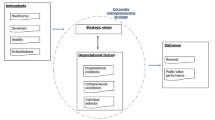Abstract
This study examined the entrepreneurial, nontraditional fundraising behaviors and activities of 23 community college presidents using interview and survey data. The institutional characteristics that facilitate entrepreneurial action and how presidents are raising these new revenues were explored. “Best practices” and implications for future research and practice are provided. The results of this analysis revealed meaningful information that is beneficial for community college presidents seeking to transform their colleges through entrepreneurial leadership. These findings indicate entrepreneurial presidents do exist and their practices can be identified. The findings also indicate that presidents’ engagement in certain specific entrepreneurial practices do result in increased nontraditional funding secured. A summary of these key findings may be used as a guide for current and future community college leaders who desire to become more entrepreneurial.
Similar content being viewed by others
References
American Association of Community Colleges (AACC). (2007). Competencies for community college leaders. Retrieved October 21, 2007, from https://doi.org/dbtext.aacc.nche/dbtw-wpd/data/CompetenciesForLeaders.pdf
Bornstein, R. (2005). The nature and nurture of presidents. Chronicle of Higher Education, 52, B10.
Clark, B. R. (1998a). Creating entrepreneurial universities: Organizational pathways of transformation. Oxford: Pergamon.
Clark, B. R. (1998b). The entrepreneurial university: Demand and response. Tertiary Education and Management, 4, 5–16.
Cohen, A., & Brawer, F. (2003). The American community college (4th ed.). San Francisco, CA: Jossey-Bass.
Deegan, W. L. (1989). Entrepreneurial management: A fourth concept of college management for the decade ahead. In T. O’Banion (Ed.), Innovation in the community college (pp. 200–214). New York: American Council on Education and Macmillan.
Dollinger, M. (2003). Entrepreneurship: Strategies and resources (3rd ed.). Upper Saddle River, NJ: Prentice-Hall.
Dougherty, K. J. (2001). The contradictory community college. Albany, NY: State University of New York.
Evelyn, J. (2004). The search for new means of support. Chronicle of Higher Education, 51, B5.
Faris, S. (1998). Community colleges: Innovators of entrepreneurial spirit. Digest, 98, 2–7.
Fisher, J., & Koch, J. V. (2004). The entrepreneurial college president. Westport, CT: Greenwood.
Fisher, J., Tack, M. W., & Wheeler, K. J. (1998). The effective college president. New York: American Council on Education and Macmillan.
Fliegler, C. M. (2007). The right stuff: New community college presidents take on accountability. Retrieved October 5, 2007, from https://doi.org/www.universitybusiness.com/viewarticle.aspx? articleid=864
Joliet Junior College. (2006). History. Joliet, IL: Joliet Junior College. Retrieved January 5, 2006, from https://doi.org/www.jjc.edu/campus_info/history/
Kirby, J. (2005). Entrepreneurial initiatives at public liberal arts and general baccalaureate colleges. ProQuest (UMI No. 3170925).
Levine, A., Templin, R. G., McPhail, C., Roueche, J. E., Shannon, H. D., & Omundson, B. (2004, October 23). The biggest challenge for community colleges: Six views. Chronicle of Higher Education, 51, B10.
McClenney, K. (2004). Keeping America’s promise: Challenges for community colleges. In Keeping America’s promise: A report on thefuture of the community college (pp. 7–21). Denver, CO: Education Commission of the States and League for Innovation in the Community College.
McLennan, F. W. (1996). Entrepreneurial management in the community colleges of Ontario, Canada. ProQuest (UMI No. 9706751).
Nunnaly, J. C. (1968). Psychometric theory. New York: McGraw Hill.
Rankin, R. (2002). The entrepreneurial role of the community college president: Opportunities and challenges (Unpublished doctoral dissertation, George Mason University).
Roueche, J., & Jones, B. (2005). The entrepreneurial community college. Washington, DC: Community College Press.
Zeiss, T. (2003). Generating new sources of revenue. New directions for community colleges, 124, 53–61.
Author information
Authors and Affiliations
Corresponding author
Rights and permissions
About this article
Cite this article
Esters, L.L., McPhail, C.J., Singh, R.P. et al. Entrepreneurial Community College Presidents: An exploratory qualitative and quantitative study. Tert Educ Manag 14, 345–370 (2008). https://doi.org/10.1080/13583880802496854
Published:
Issue Date:
DOI: https://doi.org/10.1080/13583880802496854




